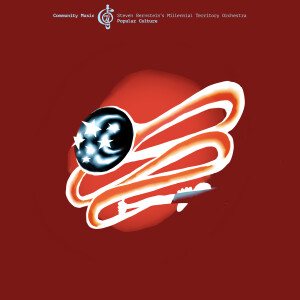 I wasn’t around, but I suspect that some of the original “territory orchestras” back in the heyday of swing owed much of their success to an ability to arrange the popular songs of the day (and the recent past) into danceable jazz. That may be why Steven Bernstein calls this particular one of his ensembles the Millennial Territory Orchestra. Aside from his talents as a musician and improviser, which are considerable, he is a spectacular arranger of popular songs into amazing jazz pieces. Witness all of MTO’s albums, and in particular this current series called “Community Music,” which culminates in this one, aptly (and maybe slightly ironically) titled Popular Culture.
I wasn’t around, but I suspect that some of the original “territory orchestras” back in the heyday of swing owed much of their success to an ability to arrange the popular songs of the day (and the recent past) into danceable jazz. That may be why Steven Bernstein calls this particular one of his ensembles the Millennial Territory Orchestra. Aside from his talents as a musician and improviser, which are considerable, he is a spectacular arranger of popular songs into amazing jazz pieces. Witness all of MTO’s albums, and in particular this current series called “Community Music,” which culminates in this one, aptly (and maybe slightly ironically) titled Popular Culture.
“I’ve always been into the idea of popular culture: what do we all connect with? What brings us together?” Bernstein says. “Also, I just like the music.” Thus on this collection we have his arrangements of works by Duke Ellington, Bessie Smith, Eddie Harris, and Charles Mingus, as well as deep cuts from the Grateful Dead and The Beatles.
Speaking of The Beatles, one of my favorite jazz tracks of the past 20 years is MTO’s cover (on MTO Vol. 1) of John Lennon’s “Cry Baby, Cry,” the enigmatic song that comes just before Lennon’s even more enigmatic sound collage “Revolution 9” on The Beatles, commonly known as The White Album. Bernstein returns to that album for another deep cut, George Harrison’s spooky devotional “Long, Long, Long,” which coincidentally ends side three, which means the next song after it is “Revolution 1.” My judgment of Bernstein’s skill as an arranger rests heavily on what he does with Beatles songs. His never sound cringey the way many other Beatles covers do. This time, playing melody on his flugelhorn in front of a sinuous twining backing from clarinet, baritone sax and trombone, Bernstein matches Harrison’s deeply inward looking mood, but then turns George’s more upbeat but still somber bridge verse into a slightly playful countermelody. And, Bernstein has taken the the little guitar-and-bass riff from the song’s verses, a series of upward-trending eighth-note couplets, and used them in the song’s intro. (The players on the parts I highlighted, by the way, are Erik Lawrence on bari sax, Doug Wieselman clarinet, and Curtis Fowlkes trombone.)
As with much of what Bernstein does, the spirits of New Orleans and Elllington permeate Popular Culture. Lots of urbane cool slinkiness and joyous funky grooves behind rich interplay from the horn section. “Black Peter” is a swampy take on this Dead cut from Workingman’s Dead, with guitarist Matt Munisteri taking the instrumental and vocal lead.
“It has a New Orleans feeling, the way I imagine a riverboat band may have sounded, then the New York City vibe because of the intensity and intent,” Bernstein says. “And in the bridge you hear that West Coast psychedelic haze.”
The set opens with Eddie Harris’s “I’m Gonna Leave You By Yourself,” a slinky blues groove laid down by bassist Ben Allison and drummer Ben Perowsky, featuring Wieselman’s clarinet and Peter Apfelbaum’s tenor out front. Ellington’s “Flirtibird” features, well, more slink, but in a powerful way. Everyone goes to town on this one, particularly Bernstein on slide trumpet, and Lawrence on the big sax. An excellent transcription by the great David Berger, an internationally recognized Ellington authority and leader of his own big band.
Bessie Smith probably had the best known version of Porter Grainger’s “Put It Right Here.” On this version, Munisteri plays the blues melody over the deep funky groove of the orchestra in the lengthy intro before it breaks into a jaunty swinging blues that really kicks it. And the date wraps with Charles Mingus’s dreamy elegy to Ellington, “Duke Ellington’s Sound of Love.” It sounds so much like late Ellington that I wouldn’t know the difference. There’s lots of clarinet, trombone and baritone sax here, and a swervy tenor solo too.
So take a trip with the MTO to a land where a big(ish) band playing top notch jazz arrangements remains a mainstay of popular culture. It can almost make you wish rock and roll never happened.
(Royal Potato Family, 2022)
